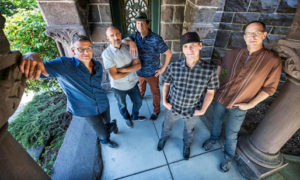The Dynamism of moe.

Thirty years into its career, the jam band moe. has delivered 11 studio albums and a slew of live releases under its belt. The band —Al Schnier and Chuck Garvey on guitars and vocals, Rob Derhak on bass and vocals, Jim Loughlin on percussion and vibes, and Vinnie Amico on drums — has shared the stage with a wide range of acts, including Allman Brothers, the Who and Robert Plant.The current tour finds the band co-headlining with Blues Traveler. G. Love opens the show.
Garvey spoke about the group’s legacy during a phone call from a Norfolk, Virginia stop.
So how did this tour come to be?
We had talked about doing something like this rather than touring on our own. It’s good to put together a package and tour. We’ve done it in the past. It’s not easy because lots of bands like to play festivals and split their time between their own shows and bigger events. One thing with Blues Traveler and us is that we followed in their footsteps. We were a couple of years later than them. We more of a jam band but of the same era. It seemed like a good match, and we played a couple of shows with them before. We played in Philadelphia a couple of times, and [Blues Traveler frontman] John [Popper] came in and sat in. He sat in for the whole set. He stays up on stage with us. He’s an intuitive musician. It’s fun to meet people like that and play with someone who plays a completely different instrument. After that experience, we knew it would work with the two bands.
What was the jam band scene like when moe. first started out? There must’ve been far fewer bands and fewer festivals, right?
The term hadn’t been coined yet but there was this scene of people following in the footsteps of the Grateful Dead and the Allman Brothers and various jazz artists. We were an oddball band. You try to find your niche. We were lucky in that we could fit into a couple of different scenes. We could play at a variety of venues. Some venues were more punk venues. We were booking our own shows. Al would call places up and say he had a band and would send them music. That was when we first started touring regionally. It was a lot of hard work. We tried to work constantly. That helped the band get better and develop a fan base, and people started talking about us.
How’d you learn to improvise?
It developed over time. When we first started playing, we were playing a mix of music. We liked bands like Fishbone and Primus and Frank Zappa and Steely Dan. We’d sometimes play shorter songs and sometimes songs with more extended solos or composed stuff. Then, we realized some nights we would have to be on stage for two or three hours playing two sets. We’d have to fill that time. We started making segues between songs and putting covers within our songs and trying to do weird stuff like that. It was a mix of improvising and rearranging our songs and sets to accommodate those long nights. It turned out to be much more fun. It was something that got developed as we went. Since then, we’ve found a variety of ways to butcher our own songs and butcher other people’s songs.
It’s always been a quest of trying to touch on as many stylistic elements as we can within a song or within a set.
Did you try to expand your sonic range on your studio albums too?
We’re not trying to show off, but it comes from the fact that we have multiple songwriters and everyone has a variety of likes. It’s not a conscious effort. We realized a long time ago that it’s good not to try. Trying for a specific goal in some regards was less rewarding than just wanting to please ourselves. In doing that, the band is happy, and hopefully, the people listening are happy. The result might be unique or exciting for us, and hopefully, that translates. Every time we go into the studio, we try to pick our favorite songs from the new batch of stuff we’re working on and make a cohesive album but really we’re just trying to please ourselves as songwriters. We go through phases of rediscovering certain kinds of music or you finally follow something you love and follow its path backward and realize how it’s connected to European music or the blues or jazz. If you’re lucky as a musician, you’re able to continually find new things that are inspiring. Otherwise, you’re just doing the same thing. It’s like a bad desk job.
What’s kept the band going for thirtysomething years?
One of the top factors is that we have this friendship and family vibe in our organization and it’s gotten us through a lot. It’s been a strong factor in our general mental health and being inspired to do everything else in life. All of us have been fortunate to have good family support. Our private lives and working lives have been a mix of all that. Improvising every night keeps things fresh. It’s terrifying and rewarding. There’s some push and pull sometimes, and that’s exciting. There are failures but the rewards are greater when everything is clicking, and that happens most of the time. We’re able to have a groupthink and go somewhere new. It’s like having a conversation with your friends. You let everyone speak and contribute, and at the end of the night, you come to a good conclusion and have a good laugh about it. It’s that kind of dynamic. We don’t repeat the same songs every night. That also helps.











